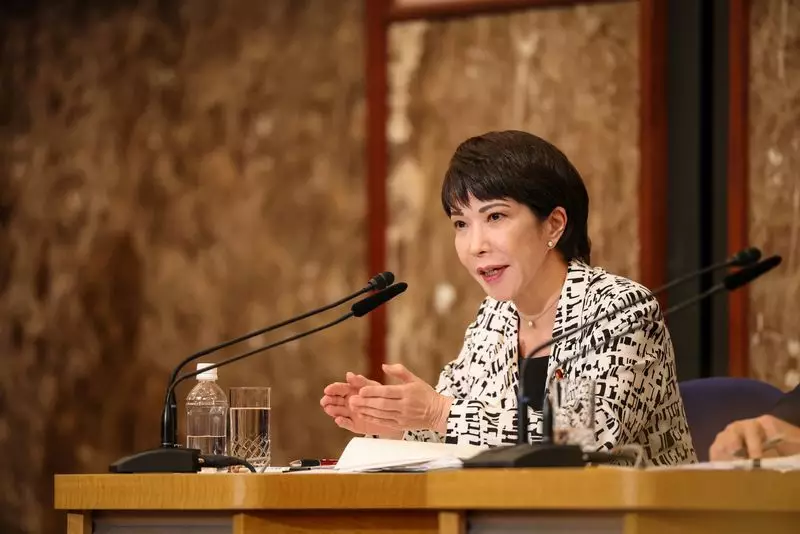In an intriguing turn of events in Japanese politics, Sanae Takaichi, who currently serves as the minister responsible for economic security, has taken a strong stance on the controversial issue of interest rates as she competes for leadership within the ruling Liberal Democratic Party (LDP). At a recent news conference that marked the gathering of nine leadership candidates, Takaichi expressed her belief that maintaining ultra-low interest rates is crucial for supporting the nation’s fragile economic recovery. Her assertion that it is “too early” for the Bank of Japan (BOJ) to consider further interest rate hikes underscores a significant divergence from the opinions of many economists who forecast additional monetary tightening.
Takaichi’s comments reflect a wider concern regarding Japan’s economy, which, despite showing signs of improvement, remains vulnerable to fluctuations that could disrupt its progress. Her emphasis on fiscal and monetary support reveals her understanding of the delicate balance that must be struck to foster a stable economic environment. Indeed, these comments are not isolated; just a day prior, Takaichi addressed similar themes on her personal YouTube channel, thereby amplifying her message about the necessity of sustained economic support.
The BOJ’s recent decisions to abandon negative interest rates and raise short-term interest rates to 0.25% encapsulate a pivotal moment in Japan’s economic policy. These measures, introduced in March and July respectively, were predicated on the belief that the economy is heading towards a sustainable achievement of its 2% inflation target. BOJ Governor Kazuo Ueda’s indications of further rate increases, should inflation hold steady and wage gains be solid, create a challenging backdrop against which Takaichi and her peers are vying for leadership.
This dynamic reveals a fundamental tension within Japan’s economic framework: the need to support recovery while managing inflationary pressures. The central bank’s cautious optimism is tempered by rising living costs, which can significantly impact consumer spending—a vital component in any economic recovery strategy. Thus, the impending leadership race carries significant implications for Japan’s future monetary policy and economic stability.
As the LDP prepares for its leadership election scheduled for September 27, the stakes have never been higher. Incumbent Prime Minister Fumio Kishida’s decision to step down after a three-year term has sparked intense competition among the candidates. The new leader, likely to ascend to the prime ministership due to the LDP’s commanding majority in parliament, will inherit a complex array of challenges. With rising costs of living on the agenda, Takaichi’s leadership could pivot Japan’s economic strategy toward prioritizing growth over strict monetary tightening.
Interestingly, members of the LDP have taken varied stances on fiscal measures. Most candidates have posited the necessity for significant spending packages to mitigate the impact of inflation, yet many have stopped short of detailing how such initiatives might be financed. This ambiguity raises questions about the sustainability of proposed expenditures, given Japan’s already sizeable public debt.
Among the candidates, former Foreign Minister Taro Kono has emerged as a notable voice advocating for a reevaluation of fiscal policies. Kono cautions that increasing expenditures or extending generous subsidies does not guarantee economic growth, emphasizing that Japan must confront the pressing need to improve fiscal health. His perspective highlights the importance of fiscal prudence, especially as rising interest rates further burden an already strained public debt situation.
Furthermore, Toshimitsu Motegi, another candidate, proposed utilizing Japan’s considerable currency intervention reserves to fund proposed expenditure. While most of these reserves are currently invested in U.S. government bonds, Motegi suggests a reallocation towards more lucrative assets. This strategy, however, raises concerns regarding the potential risks associated with such investments, particularly in a global economy that remains unpredictable.
As Japan stands at this critical economic juncture, the decisions made by the new leadership will have far-reaching implications for the country’s financial health and recovery trajectory. Takaichi’s appeal for low interest rates may serve as a crucial lifeline for Japan’s fragile economy, but it contrasts sharply with an increasingly hawkish stance from the BOJ. With diverse viewpoints from the LDP candidates, the upcoming leadership election will not only decide the party’s direction but also shape the future economic landscape of Japan, which finds itself balancing growth, sustainability, and fiscal responsibility in an unpredictable environment.

